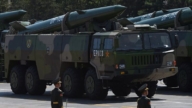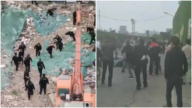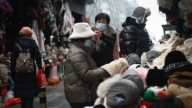【新唐人2014年06月25日讯】目前中国大陆富商扔下巨额债务逃跑的现象层出不穷,甚至曾经荣登“胡润百富榜”的知名首富也难逃跑路厄运。专家指出,中共对民运企业政策是民营企业陷入危机的主要原因,而对僵尸般的国营企业的无限度注资,将拖垮中国经济。
据报导,6月16号起,杭州知名企业“中都控股集团”董事长杨定国已经失去联系,监控视频显示,杨定国消失之前从办公室搬走8个箱子,据说箱里藏着现金、收藏品和金币等贵重物品。
公开资料显示,“中都控股集团”成立于2002年,拥有20多家子公司,业务涉及浙江、安徽等多省的房产、百货、酒店、金融、园林、物业等项目。多次被银行和授信单位评为信用AAA级。目前,“中都集团”多家百货门店、房地产业务等其他业务都已经停业。而“中都集团”已经欠下20亿人民币巨额借债,连日来各路债主正在占领集团总部。
17号,安徽桐城市工商联主席、总商会会长刘克胜,也突然去向不明。身家八亿多,坐拥九家公司的刘克胜失联的原因,据说是资金交易链断裂。
5月底,温州商界具传奇色彩的女富商徐云旭,也消失得无影无踪。5月27号,曾经荣登“胡润百富榜”的柳州首富廖荣纳,因为深陷巨额债务的泥潭,被立案调查。
北京师范大学MBA导师段绍译:“第一点中国不是真正的市场经济,政府的干预太大,受政府政策的影响太大,很多企业很难有正确的预期,第二,这些老板整体素质偏低,以为自己有多么厉害,融资过程中不计后果,第三中国对损人利己的行为打击不力,很多骗子更加不计后果。”
北京清华大学经济管理学院教授杨斌:“对民营企业扶持根本就没有,没有降息也没有减息,这叫什么扶持,现在明显的经济危机,国内生产消耗不了,出口,人民币升值了怎么出口,投资不行了,哪个企业是兴盛的?没有。在这种情况下,国家不扶持,那就倒闭、逃跑,跳楼的都有。”
中共喉舌《人民网》盘点了最近两年来中国“跑路的10大著名富商”,其中包括“世纪天成房地产公司”董事长黄水木、,“快播科技”公司执行长王欣、温州创业青年楷模候选人潘晓勇等。报导说,这些富商大多都是因为债主围堵,躲债跑路。
旅美经济学家简天伦指出,中国的贷款政策使民营企业陷入危机。
据中共官媒报导,中国民营企业融资难,融资贵,小额贷款平均利率超过20%,而银行搞的互保政策,又导致个别企业出现经营困难而无法偿还贷款时,导致其他企业一块遭殃。
段绍译:“中国的金融主要是为国企服务的,国企可以很低的成本就可以借到银行的钱,而民间的企业很高的利息也很难借到银行的钱,甚至基本借不到。”
北京师范大学MBA导师段绍译指出,很多民营企业表面上亏钱,是因为它们负债太多,而国营企业,因为它的垄断性,以及国家的政策、土地支持、贷款支持,营业成本低,即使表面上盈利,实际也是亏损。
杨斌:“民营企业是生产的主力,占GDP的70%,就业占7、80%,不出好政策,一点希望都没有,这国家经济形势。国有企业本来僵在那儿了,很难活,你非要注资增加它的活力,我认为政府就在后退,政策不出,这经济好不了。”
英国《路透社》报导说,中国的民营企业是在夹缝中找生活。由于缺乏公平的经营环境,加之名目繁多的税负,不断上升的劳动力及物料成本,以及银根收紧等多种因素的挤压,中国的民营企业家们正面临着去留两难的境地.
加上用工荒、钱荒、电荒,高成本、高税负,低利润的残酷现实, 报导形容民营企业在风雨中飘摇的日子,似乎比金融危机时代更加艰难。
采访编辑/刘惠 后制/葛雷
Who’s to Blame as Private Entrepreneurs
Run Away With Huge Debts
Rich businessman in China running away from huge debts
is becoming a frequent occurrence.
Even a renowned tycoon from the famous Hurun list of the
top 100 richest Chinese is included among them.
Experts say that Chinese Communists Party’s (CCP)
policies toward private enterprises are the main reasons
for the current crisis in the private sector.
They say the CCP’s endless injections into crumbling
state-owned enterprises will drag down China’s economy.
Contact with chairman Yang Dingguo of renowned Zhongdu
Holding Group is reported to have been lost since June 16.
Surveillance video showed Yang Dingguo taking eight boxes
from his office before he disappeared.
The boxes supposedly contained cash,
collectibles, gold coins and other valuables.
Zhongdu Holding Group was established in 2002.
According to public data, it owns more than 20 subsidiaries,
with business in real estate, department stores, hotels, finance,
gardening, and more, in Zhejiang and Anhui provinces.
It was awarded “Grade AAA” many times by
banks and credit agencies.
Currently many of its department stores
and real estate businesses have closed.
Zhongdu Holding Group has a huge debt
of 2 billion yuan ($321 billion), and creditors
have recently occupied its headquarters.
On June 17, Liu Kesheng, who was the Business Association
chairman and president of the Tongcheng City Chamber of
Commerce in Anhui Province also disappeared.
Liu Kesheng has more than eight hundred million yuan
and nine companies.
The reason for him losing contact is reportedly
breaking of the funding chain.
At the end of May, legendary Wenzhou businesswoman
Xu Yunxu also disappeared.
In Liuzhou City on May 27, Liao Rongnan,
a man famed as one of the 100 Richest Chinese,
was put under criminal investigation due to huge debts.
Duan Shaoyi, Beijing Normal University MBA instructor:
“Firstly, China is does not have a true market economy.
The government intervenes too much.
It’s difficult for many companies to get a correct forecast,
affected by government policies.
Secondly, the overall quality of these bosses is low.
They think they are so capable and do not consider
the consequences when they get some money.
Thirdly, they do not care about others,
so they are even more reckless."
Yang Bin, economics and management professor
at Qinghua University: “Private enterprises get no support,
such as lower interest rates.
There is obvious economic crisis.
Domestic production cannot be consumed and
export cannot be done due to RMB appreciation.
Which companies are thriving now?
Without help from the state, they go bankrupt.”
CCP mouthpiece People’s Daily listed the
“Top 10 Runaway Rich Business People,” including
the Century Tiancheng Real Estate chairman Huang Shuimu,
Kuaibo Technology CEO Wang Xin and Wenzhou City’s
young entrepreneur model candidate Pan Xiaoyong.
The report says these wealthy men ran off mostly due to debts.
US-based economist Jian Tianlun says that
China’s lending policies lead to crisis of private enterprises.
According to CCP official media, it is difficult and expensive
for China’s private enterprises to get investment,
with average rate over 20% for small amount of investment.
Banks’ mutual insurance policy also led to the simultaneous
collapse of many businesses whenever one business
ran into difficulties.
Duan Shaoyi: “China’s financial services are primarily for
state-owned enterprises.
State-owned enterprises can borrow money at a low cost.
It is hard for private enterprises to borrow money,
because they cannot get money from the bank."
Duan Shaoyi says that many private enterprises
seem to lose money because they have too much debt.
State-owned enterprises are profitable on the surface,
but it is due to monopoly, lending support and low costs.
Duan Shaoyi says they actually lose money.
Yang Bin: “Private enterprise is the main force of production,
accounting for 70% GDP and 70% to 80% of employment.
The country’s economy has no hope without good policy.
State-owned enterprises cannot improve.
The government’s continuous investment is backward.
Without better policies, the economy cannot improve."
Reuters reported that China’s private enterprises
are looking to survive amidst the cracks.
Lack of a fair business environment, coupled with numerous
varieties of taxes, rising labor and material costs, as well as
monetary tightening has driven China’s private entrepreneurs
into a dilemma of whether to continue or shut down.
In addition, there are issues of labor shortages,
a money shortage, an energy shortage, high costs,
high tax burdens and the harsh reality of low profits.
Reports say private enterprises are in danger, and that things
seem to be more difficult than in the period of financial crisis.
Interview & Edit/LiuHui Post-Production/GeLei




























